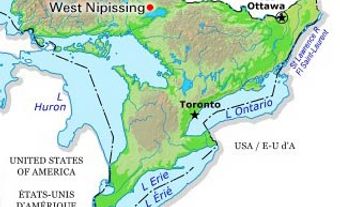Wawa
Wawa, Ont, urban area, population 2634 (2011c), 2968 (2006c). Wawa is the population centre for the Municipality of Wawa (from 1952-2007 called the Township of Michipicoten) and is where most of the township's residents reside. Wawa is located 225 km north of Sault Ste Marie.The original economic activity was gold prospecting, but for most of the 20th century, iron-ore deposits were the source of major economic activity. The ALGOMA CENTRAL RAILWAY was built to transport ore from area mines to Algoma Steel in SAULT STE MARIE. In 1960, the community was connected to the south when the Ontario portion of the Trans-Canada Highway near Wawa was completed. Closure of the last iron ore mine in 1998 combined with a downturn in the forestry sector led to an outflux of people. However, the opening of two gold mines in the area moderated the impact, as did the community's role as a regional service centre. Tourism is also important to the economy.
Settlement began in the early 1700s, when the French established a trading post (Michipicoton) in the area. The name Wawa, adopted in the 1890s, comes from the Ojibwa word for "wild goose" and was first applied to Wawa Lake where the community was established. The lake is a resting spot for migrating Canada geese. The name was changed briefly in the 1950s by railways and the post office was named Jamestown after Sir James DUNN. However, the local usage did not change and the name Wawa was restored in 1960. At the entrance to the community is a large steel statue of a Canada Goose preparing for flight.

 Share on Facebook
Share on Facebook Share on X
Share on X Share by Email
Share by Email Share on Google Classroom
Share on Google Classroom


